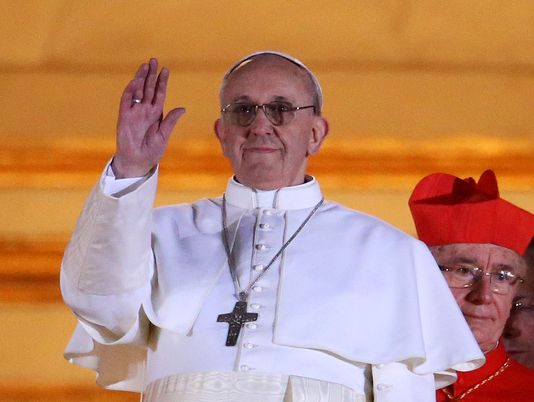
Message of the fr Bruno Cadoré to the Holy Father Pope Francis



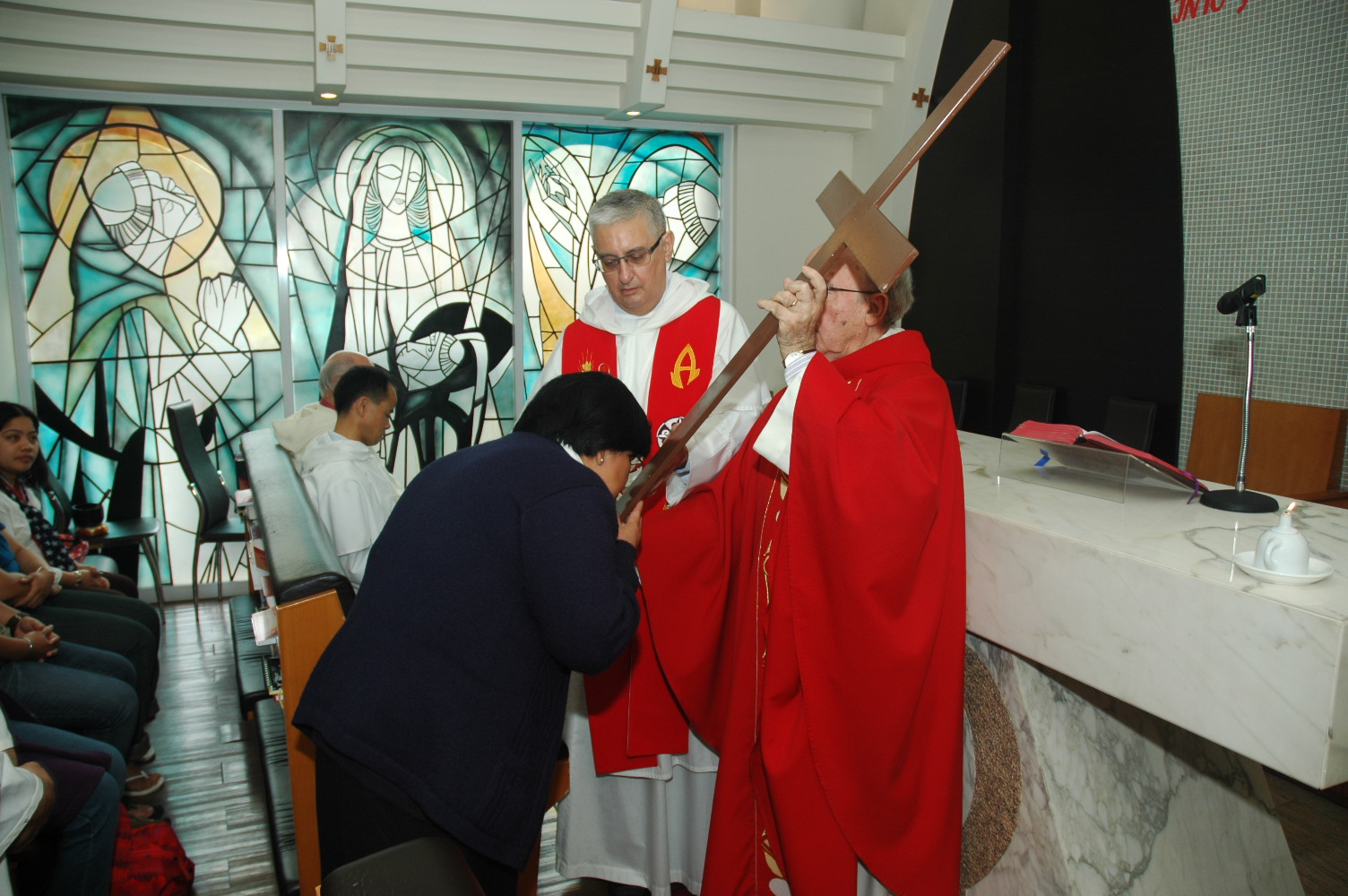
 (The best homily today, Good Friday, is a silent homily. Let the Cross speak! Forgive me, Lord, for speaking, but I feel obliged to speak of silence, of the silence I long for)
On Good Friday, we commemorate the death of our Lord Jesus Christ. We contemplate in silence the Crucified Lord. Between the death of the Crucified Lord and his resurrection we are invited to listen to the sounds of silence coming from the naked Cross.
Word and silence are two ways of speaking. We need silence not to drown in words. We need silence to speak the saving word. We need silence, to empty our hearts of selfishness and be able to listen to others, to listen to God: “I hold myself in quiet and silence, like a little child in his mother’s arms, like a little child, so I keep myself†(Ps 131:2).
Good silence is contemplative silence: the silence of creation, the silence of the cross of Jesus. It is like the silence of Mary, who kept all the things happening around Jesus in her heart (Lk 2:51): in her, “all was space for the Beloved and silence to listen†(Bruno Forte). Like the silence of Joseph who, feeling the hand of God, accepts silently the motherhood of Mary and the mysterious life of Jesus (cf. Mt 1:24). Like the silence of Jesus during his public life, a silence that underlined his words, a silence the saints learned from him. We are taught by the saints to cultivate silence in our life, to appreciate the silent love of the mystics, the pregnant silence of St. Thomas Aquinas after his mystical experience on December 6, 1273; after this, no more words, no more writings – total silence! St. John of the Cross speaks of the silent contemplation of his Beloved without the noise of voices: the tranquil night, / silent music, / sounding solitude, / the supper that refreshes and deepens love (CB 14-15). Blessed Mother Teresa of Calcutta asked her sisters to practice first the virtue of kindness and second the virtue of silence, a silence she witnessed also by smiling – to conceal her great inner sufferings.
“The Church – all of us – must discover the power of silence†(Cardinal Luis Antonio de Tagle). The liturgy speaks of a sacred silence to allow “the voice of the Holy Spirit to be heard more fully in our hearts.â€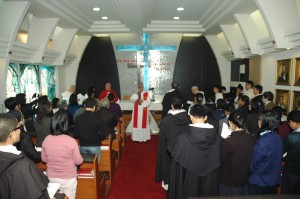
Good Friday! Jesus on the Cross is silent: his serene silence to the many questions of Herod; his calm silence to the cry of the people, “Crucify him! Crucify him!†his humble silence while he is horribly scourged at the pillar. Jesus is patiently silent through his whole passion – at times he pronounces a few words that dramatize his talking silence. Jesus, the Suffering Servant of Yahweh “never opened his mouth, like a lamb led to the slaughter-house, like a sheep dumb before the shearers, he never opened his mouth†(Is 53:7).
Jesus on the Cross faced also the silence of God. From the Cross, Jesus asked his Father: “Why have you abandoned me?†God’s answer was: silence. The silence of God, the mysterious silence of God yesterday and today in the midst of darkness, of desolation, of deadly natural calamities, of war… Why this silence, God? Where are you when we hurt terribly? Why do you allow so much evil in the world? Benedict XVI asked in his visit to the concentration camp of Auschwitz-Birkenaw: Why the Holocaust? Why, Lord, did you remain silent? How could you tolerate all this?†(May 28, 2006). I ask you, my dear God: “Why did you allow the terrible crucifixion of your Son†– of your Son? St. Dominic’s favorite book is the book of charity, that is, God’s love revealed in the cross – in the silent cross.  Dear God, “May we not forget that you also talk when you keep silent… In your silence as well as in your word, you are always the same Father, the same paternal and maternal heart, and you guide us with your love and elevate us with your silence†(S. Kierkegaard).
 “Something strange is happening—there is a great silence on earth today, a great silence and stillness†(from an Ancient Homily), the strange silence of Good Friday and Holy Saturday. It is the silence of the naked Cross, of the hopeful Cross of Christ! Our silence before the Cross of Christ is indeed the hopeful silence that is directed to Easter: from the loud silence of Jesus’ death to the sounding joy of his resurrection.
With St. Bernard we pray to the Lord: “There is in your adorable Passion, Lord, a word that moves me and speaks like no other word. It is the word you have not uttered, the word of your silence. When, Lord, when will I learn your silence, and when will I know that You, only You justify and condemn? When, my Jesus, will I learn to keep quiet, to talk little with men and much with You? When shall I imitate your silence – humble, patient, adorable silence? Oh silent Jesus, give me the holy virtue of your silence!â€
Fausto Gomez, O. P.
St. Dominic’s Priory, March 2013
 The celebration of tonight’s liturgy marks the end of Lent and the beginning of the Easter Triduum. During the Easter Triduum or the holy three days, which is the longest Liturgy of the church year, we celebrate the greatest event ever taking place in the life of any believer, the event of our salvation. It begins tonight with the washing of the feet and the establishment of the Eucharist and priesthood, continues through tomorrow, where we all will accompany Jesus all the way to the cross and concludes with the Easter Vigil, when the glory of the risen Christ will be revealed to us.
Tonight celebration is not just a dramatization, or a historical look back at events in the life Christ. It is about bringing to life, making present the mysteries we celebrate: the celebration of Eucharist, the institution of the priesthood, and the mandatum or the new commandment.
If we thumb through the pages of the Holy Scripture we will see that for the Jewish people the Passover meal was one of the biggest feasts of the year. It was a time for the people of Israel to give thanks for their salvation. To remember the night they were saved from slavery. A time to remember how the Lord went through Egypt and passed over their houses, a time to recall how the God of their fathers opened the waters of the sea to bring them to the Promised Land.
This evening, we look back at how Jesus celebrated the Passover with his disciples, bringing the Passover Meal to its ultimate purpose and meaning. It was on that table where Jesus sat with his disciples that He began to reveal the real meaning of the Passover. He showed Himself as Son of God who would be sacrificed on the first Good Friday for our sins. On that night, on the upper room and in front of his disciples, He offered Himself; He gave His Body and Blood, in the great mystery of faith as our food for eternal life. It was on that gathering on the upper room that the meaning of this celebration changed from a recall gathering to a living gathering.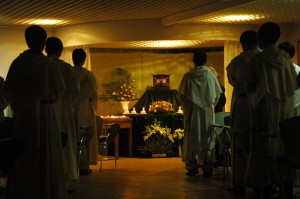
It is because of that change of essence in the meaning of the Passover meal that the Eucharist we celebrate, contrary to the Passover meal celebrated by the Jews is not just a recall of what happened in the past. We are not here just to remember, for if the love of God is not manifested through our life to the world by what we do here then it is not an authentic Eucharist. The food we receive here is not just for contemplation or adoration. It must be food for action; we have to become the new bread for the world.
It was also on that same room and at that same Supper that Jesus established, the Sacrament of Priesthood and commissioned the apostles, as the first priests of the New Covenant, with the command “Do this in memory of me.†When Saint Paul explains to Corinthians the institution of the Eucharist he says that this power is given to mere men, not because of any personal worth, but explicitly because Jesus Christ, who commanded, “Do this in memory of me†has chosen it to be so and he prayed to the Father for them “Consecrate them in the truth.†(John 17:17)
It was during this commission to service through the ministry of priesthood that Jesus washed the disciples’ feet. “Master, you will never wash my feet. Peter rebuked Jesus when He approached him and knelt in front of him. I guess Peter said this out of shock. The disciples were horrified. The washing of the feet was only done by the slaves and servants. It was a scandalous thing to do. Not only they did not understand what Jesus was doing, but they did not want to be part of it. “What I am doing, you do not understand now, but you will understand later.†Jesus answered and said to him and to the rest of the disciples. By his action Jesus symbolically overturned the whole social order. In that one significant act he showed his disciples and teaches each one of us that Christian’ greatness is not determined by position, or rights or education or title. Christian values are measured by a readiness to meet the need of the moment with an act of service and love.
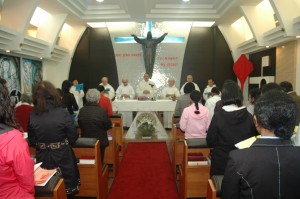 My dear brothers and sisters tonight we recall the occasion on which the institution of the Eucharist, the establishment of priesthood and the washing of the feet took place. But we are not here just to remember. The Eucharist is the culmination of Jesus’ love for us, and our celebration of the Eucharist should send you and me out from here to minister, to serve and to love the Lord in others. “I give you a new commandment: love one another. As I have loved you, so you also should love one another.†(John 13:34). This commandment is not just a remembrance of what Jesus said but, a legacy for all Christians to follow. On this Holy Thursday through these mystical actions and signs let us make a living presence the mysteries that we celebrate.
My dear brothers and sisters tonight we recall the occasion on which the institution of the Eucharist, the establishment of priesthood and the washing of the feet took place. But we are not here just to remember. The Eucharist is the culmination of Jesus’ love for us, and our celebration of the Eucharist should send you and me out from here to minister, to serve and to love the Lord in others. “I give you a new commandment: love one another. As I have loved you, so you also should love one another.†(John 13:34). This commandment is not just a remembrance of what Jesus said but, a legacy for all Christians to follow. On this Holy Thursday through these mystical actions and signs let us make a living presence the mysteries that we celebrate.
 I wish you the richest blessing of God in these Holy Days. May all of us be sustained by the Bread of eternal life as we look with hope to Easter!
Fr Alejandro Salcedo, O. P.
St. Dominic’s Priory, March 2013

|
Isaiah 50:4-7 |
Philippians 2:6-11 |
Luke 22:14 – 23:56 // Luke 23:1 – 49 |
 Today we celebrate Palm Sunday, also called Passion Sunday. It introduces us into Holy Week, during which we commemorate the chief mysteries of our faith and contemplate the words and deeds of the Lord in the last days of his earthly life. Today we celebrate the triumphant entrance of Jesus into Jerusalem to accomplish the great mystery of redemption through his Passion, Death, and Resurrection.
In simplicity of faith, let us now join the procession of the children of Jerusalem to acclaim, honor and praise Christ our King and Lord. Let us welcome him into our hearts and homes so that he may rule and govern our lives.
Jesus is the King that comes not to dominate, but to serve and to give his life as a ransom for the human race. That is why, after the joyful procession, today’s liturgy changes the liturgy of his Passion.
The Passion of Jesus is the supreme sign of love and mercy of the Father. After the drama of so much love and so much suffering, the crowd went back beating their breast. In the story of the Passion, the divinity of Jesus remains hidden; instead, the suffering servant is manifested in all his pain and misery.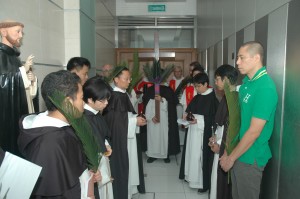
The same Jesus, who escaped from the crowd which wanted to make him king, today accepts to be honored and we join him in his triumphal entry in Jerusalem. The humiliation of Christ is contrasted with the highest honor. But how fickle this world is! Those who acclaim Christ today as King will cry for his blood within a few days!
The lowliness of Christ as the servant and his majesty as the Lord both appear in today’s liturgy. He enters the city humbly, on the back of a donkey. He is acclaimed by exalting crowds, but his earthly glory is short-lived. His Kingdom is not of this world. The red carpet treatment the people give him ultimately contributes to his condemnation.
In the suffering Christ we discern the human spirit buffeted by enemies, but still loyal to the Lord God. He chose to be humiliated one for the sake of all the lonely ones whom he has served. The depth of his abasement is the point at which Christ is fully the man of others. He became a brother and a servant of all, even to the extent of suffering and dying for them. He emptied himself: he was one like us, one with us and one of us in all things, except in sin. He died a shameful and miserable death, and this man was God. We have a God who died for us and has become a source of life for us. He lives and gives life. By his wounds we are healed.
The life and death of Christ have not only benefited our human life on earth, it has changed our very purpose in life, our relationship with God and opened the gates of heaven for us.
Millions of our brothers and sisters, through no fault of their own, have not yet heard the Good News of God’s infinite love for them; but God will find his way of extending the benefit of his love for them. There are also millions who have heard the Good News of Jesus and rejected it; God knows how to be merciful to them, too. But what about us, professed followers of Christ? During this Holy Week we should be repeatedly reminded of what God has done and is continuing to do for us. We can only beat our breast in humble contrition, for we are unworthy of the infinite love of God.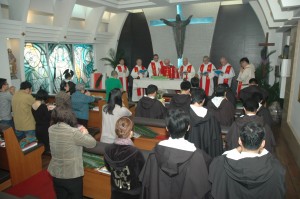
If we did not offend Jesus openly as the soldiers did on Calvary, or Pilate that condemned the innocent Christ for fear of the Jews, or Judas Iscariot that betrayed him for thirty pieces of silver; we may have done so indirectly by our indifference and negligence. Are we much better? How often have we offended him for similar motives? And we have no excuse, for we should know better than they, as to what Christ means for us.
 Fr. Dionisio Cabezón, O. P.
St. Dominic’s Priory
 Macau, March 23, 2013
